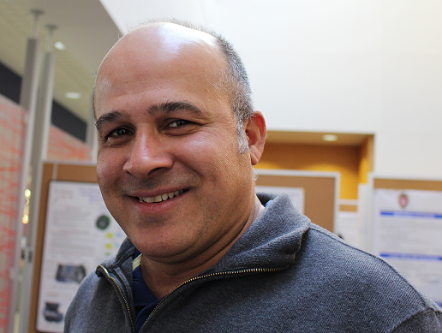Millimeter-Wave Wireless: Cross-Disciplinary Research and Technology Development
Millimeter-wave (mmW) wireless research and technology development is experiencing an explosive growth, fueled by several factors, including: Gigabit-rate and low-latency applications; advances in mmW hardware, antennas, and prototyping platforms; and new paradigms for exploiting the large number of spatio-temporal degrees of freedom. The challenges in harnessing the potential of mmW wireless are both physical and technological, and inherently cross-disciplinary. I will discuss the state-of-the-art and future implications with design tradeoffs in hybrid analog-digital beamforming architectures, features of new networking protocols needed to exploit the advanced physical layer capabilities, the importance of accurate channel models in network performance assessment, and the need for radically new approaches to channel measurement and sensing. I will also highlight the critical role of mmW testbeds, given the gaps in our current knowledgebase, and challenges inherent to their development. These findings and insights are informed by my group’s involvement in mmW research and prototype testbed development and the NSF Research Coordination Network on mmW wireless.
Date and Time
Location
Hosts
Registration
-
 Add Event to Calendar
Add Event to Calendar
- Contact Event Host
- Co-sponsored by Department of Electrical and Computer Engineering, University of Illinois at Chicago
Speakers
 Akbar M. Sayeed, Ph.D. of University of Wisconsin-Madison
Akbar M. Sayeed, Ph.D. of University of Wisconsin-Madison
Millimeter-Wave Wireless: Cross-Disciplinary Research and Technology Development
Millimeter-wave (mmW) wireless research and technology development is experiencing an explosive growth, fueled by several factors, including: Gigabit-rate and low-latency applications; advances in mmW hardware, antennas, and prototyping platforms; and new paradigms for exploiting the large number of spatio-temporal degrees of freedom. The challenges in harnessing the potential of mmW wireless are both physical and technological, and inherently cross-disciplinary. I will discuss the state-of-the-art and future implications with design tradeoffs in hybrid analog-digital beamforming architectures, features of new networking protocols needed to exploit the advanced physical layer capabilities, the importance of accurate channel models in network performance assessment, and the need for radically new approaches to channel measurement and sensing. I will also highlight the critical role of mmW testbeds, given the gaps in our current knowledgebase, and challenges inherent to their development. These findings and insights are informed by my group’s involvement in mmW research and prototype testbed development and the NSF Research Coordination Network on mmW wireless.
Biography:
Akbar M. Sayeed is a Professor of Electrical and Computer Engineering at the University of Wisconsin-Madison and leads the Wireless Communications and Sensing Laboratory. He is currently also serving as a Program Director at the National Science Foundation (NSF) in the Communications, Circuits, and Sensing Systems (CCSS) Program of the Electrical, Communications and Cyber Systems (ECCS) Division of the Engineering Directorate. He received the B.S. degree from the UW-Madison, the M.S. and Ph.D. degrees from the University of Illinois and was a postdoctoral fellow at Rice University before joining UW-Madison. His research interests include wireless communications, channel modeling, statistical signal processing, communication and information theory, time-frequency analysis, machine learning, and applications. A current focus is the development of basic theory, system architectures, and testbeds for emerging wireless technologies, including millimeter-wave wireless and high-dimensional multi-antenna multiple input multiple output (MIMO) systems. He also led the creation of the NSF Research Coordination Network on Millimeter-Wave Wireless in October 2016. At the NSF, Dr. Sayeed’s program covers the basic science and engineering of sensing, processing, and communication of information in all modalities, including integrated design of hardware and algorithms for information processing systems. He is a member of the Working Groups of two of the 10 NSF Big Ideas: 1) The “Quantum Leap” WG - an NSF-wide effort for developing new cross-disciplinary initiatives for advancing quantum information science and engineering, and 2) The “Harnessing the Data Revolution” WG - an NSF-wide effort for developing new cross-disciplinary initiatives for advancing Data Science and Engineering.
Email:
Address:United States

